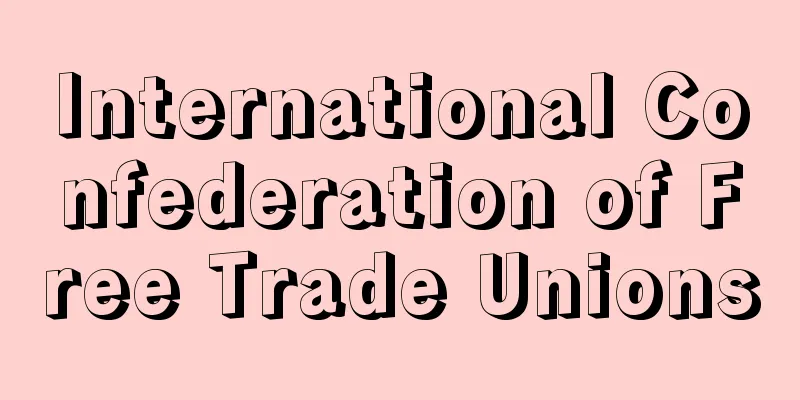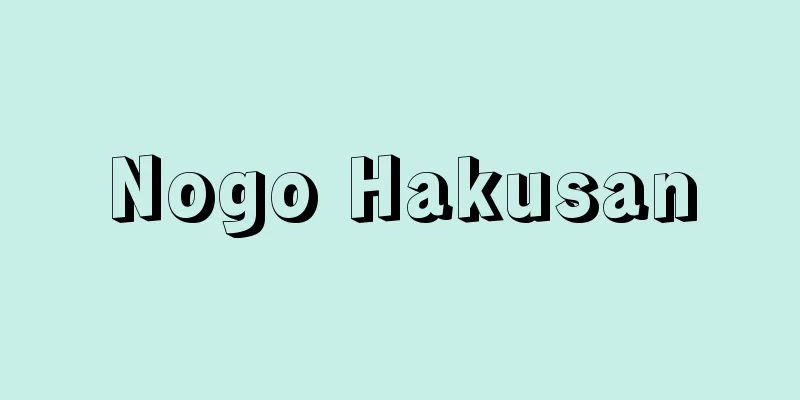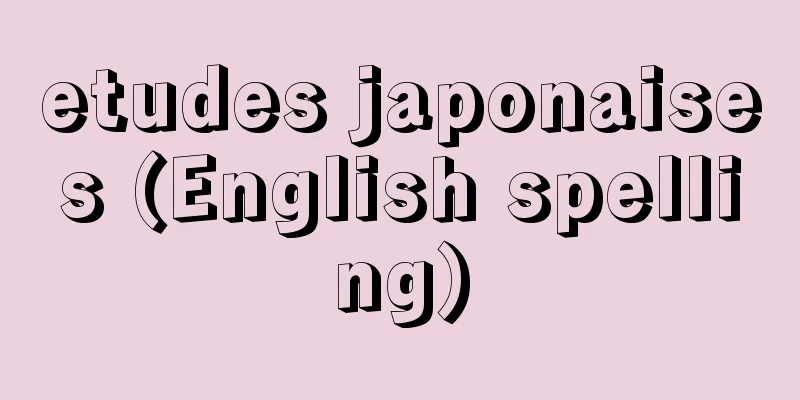International Confederation of Free Trade Unions

|
A global federation of labor unions. It was dissolved in 2006 and merged with the International Trade Union Confederation. Its abbreviation is ICFTU. The literal Japanese name is "International Free Trade Union Federation," but this is rarely used as the official name. The World Confederation of Trade Unions (WFTU), which had many members from Eastern countries, collapsed due to the dramatic changes in the Soviet Union and Eastern Europe from 1989 to 1991 and the end of the Cold War, and the WFTU became the most influential international central organization of labor unions. After World War II, it was formed by the British Trade Union Congress (TUC), which had withdrawn from the WFTU in January 1949 in support of the Marshall Plan, the Congress of Industrial Organizations of the United States (CIO), the American Federation of Labor (AFL), which had not joined the WFTU, and other organizations at the Free World Labor Conference held in London in November of the same year, and the inaugural conference held in December that year. The statute declares 16 goals, including the recognition of the rights of trade union organizations, the establishment, maintenance and development of free trade unions, the defense of free trade unions against totalitarianism and other anti-labor forces, the achievement of full employment and the improvement of working conditions, the defense of a free labor system and the abolition of forced labor, the protection of human rights, the establishment of a global collective security system, and the defense of world democracy and national freedom against totalitarianism or imperialist aggression. However, in actual activities after its founding, the Confederation adopted an anti-communist stance, and was in severe conflict with the World Federation of Trade Unions and its affiliated labor unions, while also cooperating with the productivity improvement movement from the standpoint of labor-management cooperation. From the late 1960s to the 1970s, the Confederation showed certain changes in terms of calling for a ceasefire in the Vietnam War, opposing apartheid (racial segregation policy) in South Africa, criticizing military dictatorships in Chile and other countries, and accepting negotiations and joint actions with the World Federation of Trade Unions and its affiliated organizations. We have also made efforts to reflect the demands of labor unions, such as working to strengthen the voice of workers within international organizations such as the International Labor Organization (ILO) and holding a meeting of labor union leaders from major countries (Labor Summit) before the G8 Summit to make submissions. After the virtual collapse of the World Federation of Trade Unions, former affiliates from the Middle East, Africa, South America, Eastern Europe, and the former Soviet Union, as well as unions that were not affiliated with either, joined the International Federation of Free Trade Unions one after another. In Japan, the private sector "Rengo" (All Japan Private Sector Trade Union Confederation), which was formed in 1987, joined the federation en masse, and even after the new "Rengo" (Japanese Trade Union Confederation) was formed in 1989 by unifying the public and private sectors, it continued to participate under a changed name. It was headquartered in Brussels, Belgium, and had an African regional organization (AFRO), an Asia-Pacific regional organization (APRO), and a Pan-American regional organization (ORIT), and had a cooperative relationship with the European Trade Union Confederation (ETUC). According to the regulations, the convention was to be held every four years, but in the 1950s it was held every two years, and since then it has been held every three to four years. [Jin Igarashi] Yoshiro Hotta (ed.), "Labor Unions of the World: History and Organization," New Edition (2002, Japan Institute for Labor Policy and Training) [References] | | | | | | | | | | |Source: Shogakukan Encyclopedia Nipponica About Encyclopedia Nipponica Information | Legend |
|
世界的な労働組合の連合体。2006年に解散し、国際労働組合総連合に合流した。略称ICFTU。 字義どおりに訳した日本語名称は「国際自由労働組合連盟」だが、これは正式名称としてほとんど用いられていない。1989~1991年のソ連・東欧での激変と冷戦体制の終焉(しゅうえん)によって、東側諸国の加盟が多かった世界労働組合連盟(WFTU。略称世界労連)が事実上崩壊したため、最大の勢力をもつ労働組合の国際的中央組織となった。第二次世界大戦後、マーシャル・プランを支持して1949年1月に世界労連を脱退したイギリス労働組合会議(TUC)、アメリカ産業別組合会議(CIO)、世界労連に加わっていなかったアメリカ労働総同盟(AFL)などが中心となって、同年11月ロンドンでの自由世界労働者会議と、それに引き続いて開かれた12月の創立大会によって結成された。 規約では、労働組合組織の諸権利の承認、自由な労働組合の設立・維持・発展、全体主義その他の反労働者的勢力に対する自由な労働組合の防衛、完全雇用の達成と労働条件の改善、自由な労働制度の擁護と強制労働の絶滅、人権保障、世界的集団安全保障体制の確立、全体主義あるいは帝国主義的侵略に対する世界民主主義と国家的自由の防衛など、16項目の目標を宣言している。しかし創立後の実際の活動では、反共を旨とし、世界労連およびその傘下労組と厳しく対立し、労使協調の立場から生産性向上運動にも協力した。1960年代後半から1970年代にかけては、ベトナム戦争停戦の呼びかけ、南アフリカ共和国のアパルトヘイト(人種隔離政策)反対、チリなどの軍事独裁政権への非難、世界労連やその加盟組織との交渉、共同行動の容認などの点で一定の変化を示した。国際労働機関(ILO)など国際的諸機関内での労働者の発言力強化に努め、先進国首脳会議(サミット)前に主要国労組指導者会議(レイバー・サミット)を開いて申し入れ活動を行うなど、労働組合の要求を反映させる努力も行ってきた。 世界労連が事実上崩壊して以降、中東、アフリカ、南米、東欧、旧ソ連などの旧加盟組織やどちらにも未加盟であった組合の国際自由労連への加入が相次いだ。日本では、1987年(昭和62)に結成された民間の「連合」(全日本民間労働組合連合会)が一括して加盟し、官民統一による1989年の新「連合」(日本労働組合総連合会)結成後も、名義を変更して参加を継続した。ベルギーのブリュッセルに本部を置き、アフリカ地域組織(AFRO)、アジア太平洋地域組織(APRO)、汎(はん)アメリカ地域組織(ORIT)をもち、ヨーロッパ労連(ETUC)とは協力関係にあった。大会は、規約では4年に一度の開催となっていたが、1950年代は2年に一度、それ以降は3~4年に一度の割で開催された。 [五十嵐仁] 『堀田芳朗編著『世界の労働組合 歴史と組織』新版(2002・日本労働研究機構)』 [参照項目] | | | | | | | | | | |出典 小学館 日本大百科全書(ニッポニカ)日本大百科全書(ニッポニカ)について 情報 | 凡例 |
<<: National bond redemption system
>>: International Frequency Registration Board
Recommend
OS/2 - OS2
An operating system (OS) developed by IBM for 32-b...
Dinant (English spelling)
A town in the province of Namur in southern Belgiu...
Via Cassia
A road built by the Romans that ran from Rome thro...
Kühn, JG (English spelling) KuhnJG
…It is well known that the German botanist Heinri...
Chronicle of Prosperity
A genre of Chinese comic stories that was popular ...
Paradoxurinae
…General term for mammals of the carnivora order,...
Löwith, Karl
Born: January 9, 1897 in Munich Died May 24, 1973....
Ezo no Hakusan Ichige - Ezo no Hakusan Ichige
...As a species, it is widely distributed in the ...
Iga no Suigetsu
A kodan (traditional storytelling). It describes t...
Ainu Hearthside Tales - Ainu Hearthside Tales
…He also established the Batchelor School and con...
dikastai
...Solon abolished the laws of the Dracon except ...
The beginning of the matter - Satahajime
One of the events held in the Muromachi Shogunate....
Atlantic City
A resort town in the northeastern United States, N...
Yofukuki - Yofukuki
Written by Watarai Enkei, a Shintoist of the Edo p...
Nouveau riche - Narikin
A person who accumulated wealth in a short period...









